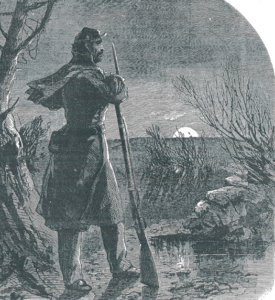 December 22, 1864
December 22, 1864
A thin layer of clouds glowed silver and the nearly full moon provided enough light to see the opposing earthworks to the west. Goma vigorously rubbed the scars on his wrists trying to increase circulation. The light wind was from the west and he could smell the last burning embers from dozens of fires. The cool Virginia soil tried to steal what little body heat he had left.
Goma looked back toward his own lines and hoped the replacement pickets would arrive soon. This was Goma‘s first time on picket duty and he didn’t like being alone.
Almost three hundred yards separated the Union and Confederate main lines just outside of Petersburg and because the distance was quite large, both sides had additional sparely manned buffer picket lines that were inside their regular pickets and only about fifty yards apart. No large scale fighting normally occurred during the winter months and both sides dealt with shortages and boredom. The South, with their supply lines under constant siege, suffered from food shortage much more than the North.
“Hey, Yankee, can you hear me?” Goma turned abruptly toward the Rebel line. “Hey, Yankee,” the voice repeated in a heavy southern draw, “You ‘bout ready to give up and go home?”
Goma hesitated. Then he said, “Neva’ happin, Johnny.”
A brief silence. “You a darkie?”
Just then Goma’s replacement crawled into the trench and Goma crawled back to his lines. When he got to his tent, he thought about the voice. Something was very familiar.
Only a few short months ago, Goma was a groom at a plantation near Jonesboro, Georgia. His father’s father had been brought across the ocean and was sold to a farmer near Savanah where Goma was born. When Goma was twenty, he was sold to John McCord, the master of Stately Oaks Plantation near Jonesboro, Georgia. While John McCord was a kind slave master, his son, Elijah, in trying to impress his father, treated Goma and others harshly. Whenever Elijah found the least little fault with Goma’s work, he would frequently yield a whip or lock Goma away.
In early September, 1864, when Sherman’s Army of the Tennessee drove out all the belligerent Confederates, all the slaves were freed. Not knowing what to do, Goma followed Sherman’s army and was shortly inducted into the United States Colored Troops and became part of XXV Corps of the Army of the Potomac under General Edward Hines. The U.S.C.T. troops were extensively deployed in the Siege of Petersburg.
The next morning, Goma sat around the breakfast fire with several of his new friends, all ex-slaves. He suspected the Rebel voice he had heard in the night might be Elijah, his old nemesis.
They asked him how badly he was treated and Goma showed the scars on his back. The discussion became heated.
“We got ourselves the big equalizer,” one said in a heavy accent picking up his rifle, “only one way to settle this.”
“How would we do it?” Another asked. “We can’t just walk over there and shoot him.”
“We could crawl over the next cloudy night. Shit. Nobody would miss the dirty bastard,” the first one said. “What do you think, Goma? You’re the one he treated so bad.”
Goma was quiet for a moment, then said, “You know? The first few times he beat me, I had this rage inside. It kept me going. I hated that man more than I could hate anything.” He waited a moment as if to choose the right words. “But then, after a while, I just started to feel sorry for him.”
“How could you feel sorry for a man who is beating you? That just sounds impossible, Goma. You gotta be crazy,” the first said.
“Yeah, I know it sounds crazy and maybe it is,” Goma said, “but I feel like if we shoot him, we might be worse than him.”
“You can’t get worse than him, Goma, that man is the worst there is. He’s the bottom of the barrel. He’s the devil himself.”
Slowly, the conversation died down, and the men all started talking about Christmas and how they wished they were away from all the killing, the war. They wanted to get on with their lives even though nobody had any idea what the future would bring after the war.
The next day, Goma was told he would again be on picket duty that night. He had hoped to celebrate Christmas eve with his friends, but he was used to being disappointed, and he accepted it without comment. Most soldiers only thought about three things: Food, shelter and home. Goma had no home except where he slept each night.
The entrenched Union line extended nearly thirteen miles from end to end with well over one hundred thousand soldiers living in ramshackle shelters. Some were tents with the sides built up with dirt to keep the wind out. Others were wooden structures made of logs. Some had stoves inside. The soldiers were given total freedom to build whatever they wished to keep them dry and warm.
Since early morning, wagons loaded with special Christmas food were arriving from the north. Turkeys, chickens, cakes and pies, all ready to eat. Goma and his friends were able to get a whole turkey and a couple pies. After dinner, different groups broke into song, however, as evening approached, Goma reported to the duty officer and prepared to crawl out to the first line of pickets. He carried his Springfield musket, ammunition pouch and a knapsack containing a small apple pie.
At the appointed time, just after dark, he started to crawl to the main picket line. The early night sky was heavy with dark clouds and he could have walked because of the low visibility, but Goma felt safer crawling. The area between the battle siege lines was grassless and he could feel the hard dirt clods through his foraging jacket. By the time he got to the line of picket trenches, the other replacements had already arrived. He was informed he was assigned the outer picket line from around 12:00 midnight to 2:00 am.
The area between the two outer pickets was called ‘no man’s land’, and as the moon peeked through the breaks in the clouds, it looked like the gates of hell. Filled with shell holes, old trench emplacements and scattered battle debris, Goma wound his way to the ditch where he would spend the first hours of Christmas day. After relieving the prior sentry, he settled in, sitting on part of a cannon caisson that had been destroyed earlier. Every few minutes he would peer above the ground toward the enemy lines to verify what he suspected: nothing would happen on Christmas. He started to think about the pie and his mouth watered.
“Hey, Yankee, are you there?” The voice was clear as a bell. The same voice as before. “It’s Christmas, are you Northerners going back north where you belong?”
“No chance of that, Johnnie,” Goma said.
“I remember your voice, you’re a god damned darkie, aren’t ya.”
Goma now knew who the man was. He was Elijah. For some reason, he always used the word ‘darkie’. Like it was his invention or something. Made him feel like he had some control over the English language.
“You bet your sweet ass I’m a darkie, and this darkie knows what a cruel slave master you really are. I’ve got the scars to prove it.”
Elijah said nothing for a few moments. “Goma? Goma?—You’re Goma! What the hell are you doing out here. My God—Goma.” Elijah was silent for a few minutes. In a more measured voice he said, “You still belong to me. You are my property, although you were the laziest god damned slave I ever owned.”
“I’m a free man,” Goma said in a firm voice.
“Free, my ass. I can see that I didn’t whip you near enough. I loved seeing my whip rip open your skin. The blood oozing out. Hearing your sorry ass whimpering. Yep, I should have done more of it. Would’ve made a man out of you.”
Goma just smiled. He always knew that when Elijah bragged about something, it was his way of trying to convince himself he was important. “I hear you Johnnies aren’t getting much to eat. That true? I hear you are near starving.”
“We get plenty to eat,” Elijah said, “I get so full, sometimes I have trouble walking.”
“Good to hear, Johnnie, guess that means you don’t want any of my apple pie.”
“You got apple pie?—apple pie?” Elijah said in disbelief.
“Apples covered with brown sugar and pecans. Yep.”
“I don’t believe it. Not for one minute.”
Goma didn’t answer. He waited.
“Apple pie?” Elijah asked again.
Ten minutes later, Goma had made up his mind. He crawled up over the top of his ditch and inched his way toward Elijah’s position. The moon light was obscured by passing clouds. When he got to the hole Elijah was in, Elijah put the barrel end of his musket to Goma’s forehead. “You’re dumber than I ever imagined,” Elijah said, “now you’re gonna die.”
Goma reached into his knapsack and pulled out the pie and handed it to Elijah. Elijah first stared at the pie, then at Goma, his mouth open in wonderment.
“Merry Christmas,” Goma said and he crawled back to his own trench.
[Photo courtesy of New York State Library]

Leave a Reply